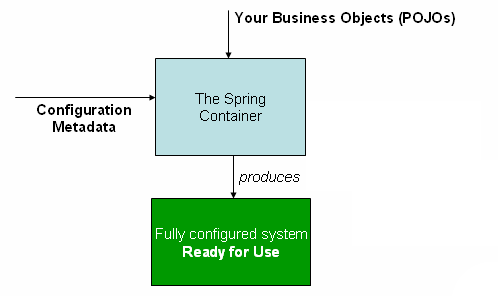容器概述
这org.springframework.context.ApplicationContextinterface 表示 Spring IoC
容器,并负责实例化、配置和组装 bean。
容器在组件上获取其指令,以实例化、配置和
通过读取配置元数据进行汇编。可以表示配置元数据
作为带注释的组件类、具有工厂方法的配置类或外部
XML 文件或 Groovy 脚本。无论使用哪种格式,您都可以编写应用程序,并将
这些组件之间丰富的相互依赖关系。
的ApplicationContext接口是核心 Spring 的一部分。
在独立应用程序中,通常会创建一个AnnotationConfigApplicationContext或ClassPathXmlApplicationContext.
在大多数应用程序场景中,不需要显式用户代码来实例化一个或
Spring IoC 容器的更多实例。例如,在普通 Web 应用程序场景中,
一个简单的样板 Web 描述符 XML。web.xml应用程序的文件就足够了(参见 Web 应用程序的便捷 ApplicationContext 实例化)。
在 Spring Boot 场景中,应用程序上下文是隐式引导的
基于通用设置约定。
下图显示了 Spring 工作原理的高级视图。您的应用程序类
与配置元数据结合使用,以便在ApplicationContext是
创建并初始化后,您将拥有一个完全配置且可执行的系统或应用程序。

配置元数据
如上图所示, Spring IoC 容器使用一种形式的 配置元数据。此配置元数据表示您作为 application developer,告诉 Spring 容器实例化、配置、 并在应用程序中组装组件。
Spring IoC 容器本身与此格式完全解耦 配置元数据实际上是写入的。如今,许多开发人员为他们的 Spring 应用程序选择基于 Java 的配置:
-
基于注解的配置:使用 应用程序组件类上基于 Annotation 的配置元数据。
-
基于 Java 的配置:定义应用程序外部的 bean 类。要使用这些功能,请参阅
@Configuration,@Bean,@Import, 和@DependsOn附注。
Spring 配置由至少一个(通常多个)bean 定义组成
容器必须管理。Java 配置通常使用@Bean-注释
方法中的@Configuration类,每个类对应一个 bean 定义。
这些 Bean 定义对应于组成应用程序的实际对象。
通常,您可以定义服务层对象、持久性层对象(如
存储库或数据访问对象 (DAO)、表示对象(如 Web 控制器)、
基础设施对象,例如 JPAEntityManagerFactory、JMS 队列等。
通常,不会在容器中配置细粒度的域对象,因为
创建和加载通常是存储库和业务逻辑的责任
domain 对象。
XML 作为外部配置 DSL
基于 XML 的配置元数据将这些 bean 配置为<bean/>元素
顶级<beans/>元素。以下示例显示了
基于 XML 的配置元数据:
<?xml version="1.0" encoding="UTF-8"?>
<beans xmlns="http://www.springframework.org/schema/beans"
xmlns:xsi="http://www.w3.org/2001/XMLSchema-instance"
xsi:schemaLocation="http://www.springframework.org/schema/beans
https://www.springframework.org/schema/beans/spring-beans.xsd">
<bean id="..." class="..."> (1) (2)
<!-- collaborators and configuration for this bean go here -->
</bean>
<bean id="..." class="...">
<!-- collaborators and configuration for this bean go here -->
</bean>
<!-- more bean definitions go here -->
</beans>| 1 | 这idattribute 是标识各个 bean 定义的字符串。 |
| 2 | 这classattribute 定义 bean 的类型,并使用完全限定的
类名。 |
的idattribute 可用于引用协作对象。The XML
本例中未显示 for reference to collaborative objects。有关更多信息,请参阅依赖项。
对于实例化容器,XML 资源文件的位置路径或 paths
需要提供给ClassPathXmlApplicationContext构造函数,让
容器加载来自各种外部资源的配置元数据,例如
作为本地文件系统,JavaCLASSPATH等。
-
Java
-
Kotlin
ApplicationContext context = new ClassPathXmlApplicationContext("services.xml", "daos.xml");val context = ClassPathXmlApplicationContext("services.xml", "daos.xml")|
在了解 Spring 的 IoC 容器之后,您可能希望了解有关 Spring 的 |
以下示例显示了服务层对象(services.xml)配置文件:
<?xml version="1.0" encoding="UTF-8"?>
<beans xmlns="http://www.springframework.org/schema/beans"
xmlns:xsi="http://www.w3.org/2001/XMLSchema-instance"
xsi:schemaLocation="http://www.springframework.org/schema/beans
https://www.springframework.org/schema/beans/spring-beans.xsd">
<!-- services -->
<bean id="petStore" class="org.springframework.samples.jpetstore.services.PetStoreServiceImpl">
<property name="accountDao" ref="accountDao"/>
<property name="itemDao" ref="itemDao"/>
<!-- additional collaborators and configuration for this bean go here -->
</bean>
<!-- more bean definitions for services go here -->
</beans>以下示例显示了数据访问对象daos.xml文件:
<?xml version="1.0" encoding="UTF-8"?>
<beans xmlns="http://www.springframework.org/schema/beans"
xmlns:xsi="http://www.w3.org/2001/XMLSchema-instance"
xsi:schemaLocation="http://www.springframework.org/schema/beans
https://www.springframework.org/schema/beans/spring-beans.xsd">
<bean id="accountDao"
class="org.springframework.samples.jpetstore.dao.jpa.JpaAccountDao">
<!-- additional collaborators and configuration for this bean go here -->
</bean>
<bean id="itemDao" class="org.springframework.samples.jpetstore.dao.jpa.JpaItemDao">
<!-- additional collaborators and configuration for this bean go here -->
</bean>
<!-- more bean definitions for data access objects go here -->
</beans>在前面的示例中,服务层由PetStoreServiceImpl类
和两个数据类型为JpaAccountDao和JpaItemDao(基于
在 JPA Object-Relational Mapping 标准上)。这property name元素引用
name,以及ref元素引用另一个 bean 的名称
定义。这种id和ref元素表示
协作对象。有关配置对象依赖项的详细信息,请参阅依赖项。
编写基于 XML 的配置元数据
让 Bean 定义跨多个 XML 文件可能很有用。通常,每个个体 XML 配置文件表示体系结构中的逻辑层或模块。
您可以使用ClassPathXmlApplicationContext构造函数来加载 bean 定义
XML 片段。此构造函数采用多个Resourcelocations 的 LOCATIONS 中,如上一节所示。或者
使用<import/>元素来加载 bean 定义
另一个文件或文件。以下示例显示了如何执行此作:
<beans>
<import resource="services.xml"/>
<import resource="resources/messageSource.xml"/>
<import resource="/resources/themeSource.xml"/>
<bean id="bean1" class="..."/>
<bean id="bean2" class="..."/>
</beans>在前面的示例中,外部 bean 定义是从三个文件加载的:services.xml,messageSource.xml和themeSource.xml.所有位置路径都是
相对于执行导入的定义文件,因此services.xml必须在
与执行导入的文件相同的目录或 Classpath 位置,而messageSource.xml和themeSource.xml必须位于resources位置位于
导入文件的位置。如您所见,前导斜杠将被忽略。然而,鉴于
这些路径是相对的,最好根本不使用斜杠。这
正在导入的文件的内容,包括 Top Level<beans/>元素,必须
根据 Spring Schema 是有效的 XML bean 定义。
|
可以使用
相对 “../“ 路径。这样做会创建对当前
应用。具体而言,不建议将此引用用于 您始终可以使用完全限定的资源位置而不是相对路径:对于
例 |
命名空间本身提供了 import 指令功能。进一步
除了普通 Bean 定义之外的配置功能在 SELECTION 中可用
的 XML 命名空间中 — 例如,context和util命名空间。
Groovy Bean 定义 DSL
作为外部化配置元数据的另一个示例,bean 定义还可以 用 Spring 的 Groovy Bean 定义 DSL 表示,如 Grails 框架所示。 通常,此类配置位于“.groovy”文件中,其结构如 以下示例:
beans {
dataSource(BasicDataSource) {
driverClassName = "org.hsqldb.jdbcDriver"
url = "jdbc:hsqldb:mem:grailsDB"
username = "sa"
password = ""
settings = [mynew:"setting"]
}
sessionFactory(SessionFactory) {
dataSource = dataSource
}
myService(MyService) {
nestedBean = { AnotherBean bean ->
dataSource = dataSource
}
}
}这种配置样式在很大程度上等同于 XML bean 定义,甚至
支持 Spring 的 XML 配置命名空间。它还允许导入 XML
Bean 定义文件通过importBeans命令。
使用容器
这ApplicationContext是能够维护
不同 bean 及其依赖项的注册表。通过使用方法T getBean(String name, Class<T> requiredType)中,您可以检索 bean 的实例。
这ApplicationContext允许您读取 Bean 定义并访问它们,如下所示
示例显示:
-
Java
-
Kotlin
// create and configure beans
ApplicationContext context = new ClassPathXmlApplicationContext("services.xml", "daos.xml");
// retrieve configured instance
PetStoreService service = context.getBean("petStore", PetStoreService.class);
// use configured instance
List<String> userList = service.getUsernameList(); import org.springframework.beans.factory.getBean
// create and configure beans
val context = ClassPathXmlApplicationContext("services.xml", "daos.xml")
// retrieve configured instance
val service = context.getBean<PetStoreService>("petStore")
// use configured instance
var userList = service.getUsernameList()使用 Groovy 配置,引导看起来非常相似。它有不同的背景 implementation 类,该类是 Groovy 感知的(但也理解 XML bean 定义)。 以下示例显示了 Groovy 配置:
-
Java
-
Kotlin
ApplicationContext context = new GenericGroovyApplicationContext("services.groovy", "daos.groovy");val context = GenericGroovyApplicationContext("services.groovy", "daos.groovy")最灵活的变体是GenericApplicationContext与 Reader 结合使用
delegates — 例如,使用XmlBeanDefinitionReader对于 XML 文件,如下所示
示例显示:
-
Java
-
Kotlin
GenericApplicationContext context = new GenericApplicationContext();
new XmlBeanDefinitionReader(context).loadBeanDefinitions("services.xml", "daos.xml");
context.refresh();val context = GenericApplicationContext()
XmlBeanDefinitionReader(context).loadBeanDefinitions("services.xml", "daos.xml")
context.refresh()您还可以使用GroovyBeanDefinitionReader对于 Groovy 文件,如下所示
示例显示:
-
Java
-
Kotlin
GenericApplicationContext context = new GenericApplicationContext();
new GroovyBeanDefinitionReader(context).loadBeanDefinitions("services.groovy", "daos.groovy");
context.refresh();val context = GenericApplicationContext()
GroovyBeanDefinitionReader(context).loadBeanDefinitions("services.groovy", "daos.groovy")
context.refresh()您可以在同一ApplicationContext,
从不同的配置源读取 bean 定义。
然后,您可以使用getBean检索 bean 的实例。这ApplicationContextinterface 有一些其他方法来检索 bean,但理想情况下,您的应用程序
代码永远不应该使用它们。事实上,您的应用程序代码不应调用getBean()方法,因此根本不依赖于 Spring API。例如
Spring 与 Web 框架的集成为各种 Web 提供了依赖注入
框架组件(例如控制器和 JSF 托管 Bean),允许您声明
通过元数据(例如自动装配 Comments)对特定 bean 的依赖。